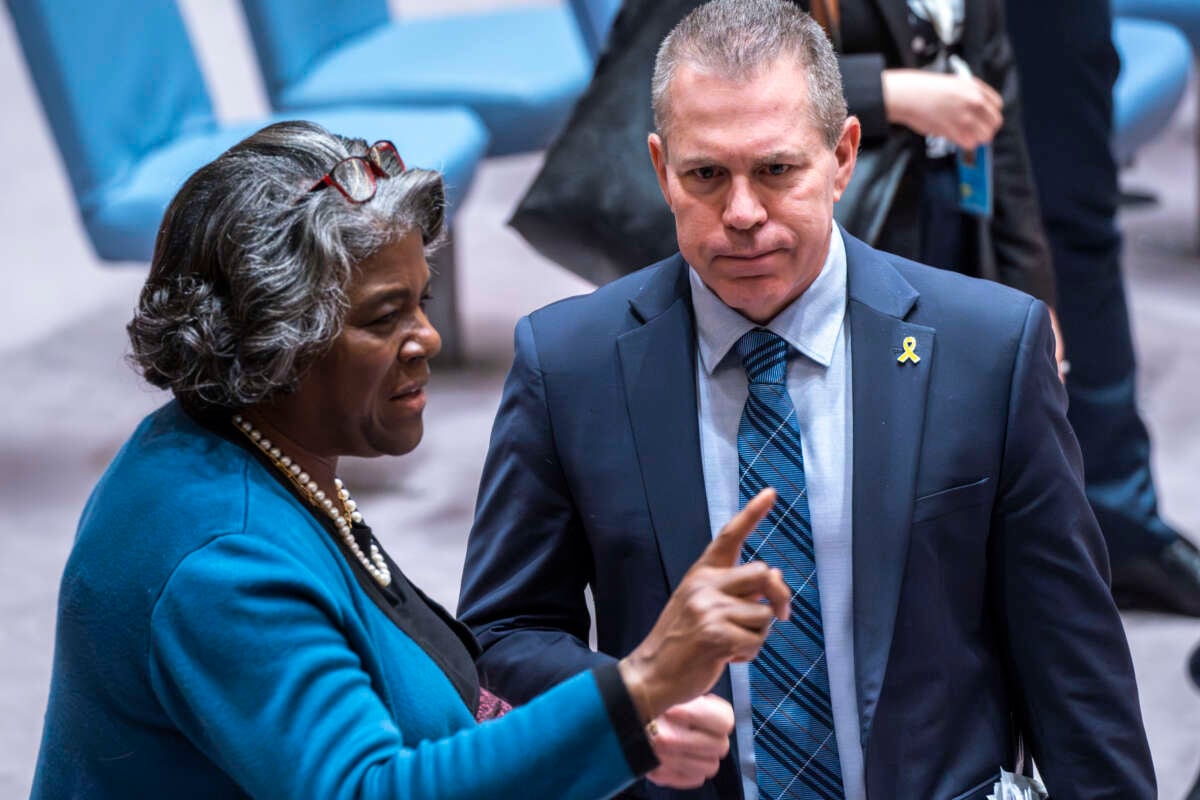Honest, paywall-free news is rare. Please support our boldly independent journalism with a donation of any size.
The U.S. is lobbying fellow UN Security Council members to vote against an upcoming resolution that would recognize Palestinian statehood, leaked documents obtained by The Intercept show, severely undercutting the White House’s stated position of supporting a two-state solution.
The State Department cables reportedly show that U.S. officials are pressuring fellow Security Council members like Malta, the president of the council this month, France, Japan and Korea to quash a request from Palestinians to be admitted as a full member of the UN, with officials from Ecuador acting as key figures in the lobbying effort.
The U.S. is undergoing a lobbying campaign in order to avoid vetoing the resolution, The Intercept reports, with officials likely highly aware of the global outrage the U.S. has caused with its multiple standalone vetoes of ceasefire resolutions that have been brought in front of the Security Council in past months.
The UN Security Council is slated to vote on Friday on the request from the Palestinian Authority, which currently controls parts of the West Bank, to vote on the application for full membership that has been pending since 2011 due to delays and a lack of consensus from the Security Council. This step would be crucial to a two-state solution, which President Joe Biden has insisted that he supports, or another outcome allowing for Palestinian self-determination, but the U.S. is once again looking to intervene on behalf of Israel and against Palestinian rights in UN matters.
If the Security Council doesn’t approve the resolution, then it would make any vote in the UN General Assembly toothless, International Crisis Group director on UN Richard Gowan told The Intercept.
“Like it or not, a General Assembly vote on this issue is of political rather than legal weight,” Gowan said. “The Assembly can only accept a new state ‘on the recommendation’ of the Security Council.”
The cables, which The Intercept’s Ken Klippenstein posted in full on his Substack newsletter, argue that recognizing the Palestinian state would be detrimental to the establishment of Palestinian statehood because it would “heighten tensions” between Palestine, its supposed Arab allies, and Israel.
“It remains the U.S. view that the most expeditious path toward a political horizon for the Palestinian people is in the context of a normalization agreement between Israel and its neighbors. We believe this approach can tangibly advance Palestinian goals in a meaningful and enduring way,” the cable says.
“We therefore urge you not to support any potential Security Council resolution recommending the admission of ‘Palestine’ as a UN member state, should a resolution be presented to the Security Council for a decision in the coming days and weeks,” it goes on.
This approach essentially denies that Palestinian representatives could, themselves, ascertain the best path forward for the Palestinian people, while also denying their ability to pursue that pathway.
The cables also lay bare the Biden administration’s efforts to oppose moves that could help advance a two-state solution — which, despite his claims otherwise, he has acted at nearly every turn to oppose.
Incidentally, also opposed to the recognition of a Palestinian state are Israeli officials. Top figures in the Israeli government, including Prime Minister Benjamin Netanyahu, have repeatedly said as such. In January, for instance, Netanyahu said that part of the goal of Israel’s genocide of Gaza was to block any future possibility of the establishment of a Palestinian state.
“In any future arrangement … Israel needs security control over all territory west of the Jordan” river, he said, as translated into English. “This collides with the idea of sovereignty [for Palestinians]. What can you do? This truth I tell to our American friends, and I put the brakes on the attempt to coerce us to a reality that would endanger the state of Israel.”
Truthout also reported this week that it is likely the administration’s internal policy to refuse to recognize the Palestinian state. Under Barack Obama, staff were told not to open correspondence that referenced the “State of Palestine,” or even correspondence with Palestinian officials that includes the Palestinian national emblem, a former State Department official told Truthout. The former official said that is likely still the policy today.
A terrifying moment. We appeal for your support.
In the last weeks, we have witnessed an authoritarian assault on communities in Minnesota and across the nation.
The need for truthful, grassroots reporting is urgent at this cataclysmic historical moment. Yet, Trump-aligned billionaires and other allies have taken over many legacy media outlets — the culmination of a decades-long campaign to place control of the narrative into the hands of the political right.
We refuse to let Trump’s blatant propaganda machine go unchecked. Untethered to corporate ownership or advertisers, Truthout remains fearless in our reporting and our determination to use journalism as a tool for justice.
But we need your help just to fund our basic expenses. Over 80 percent of Truthout’s funding comes from small individual donations from our community of readers, and over a third of our total budget is supported by recurring monthly donors.
Truthout has launched a fundraiser to add 500 new monthly donors in the next 10 days. Whether you can make a small monthly donation or a larger one-time gift, Truthout only works with your support.
